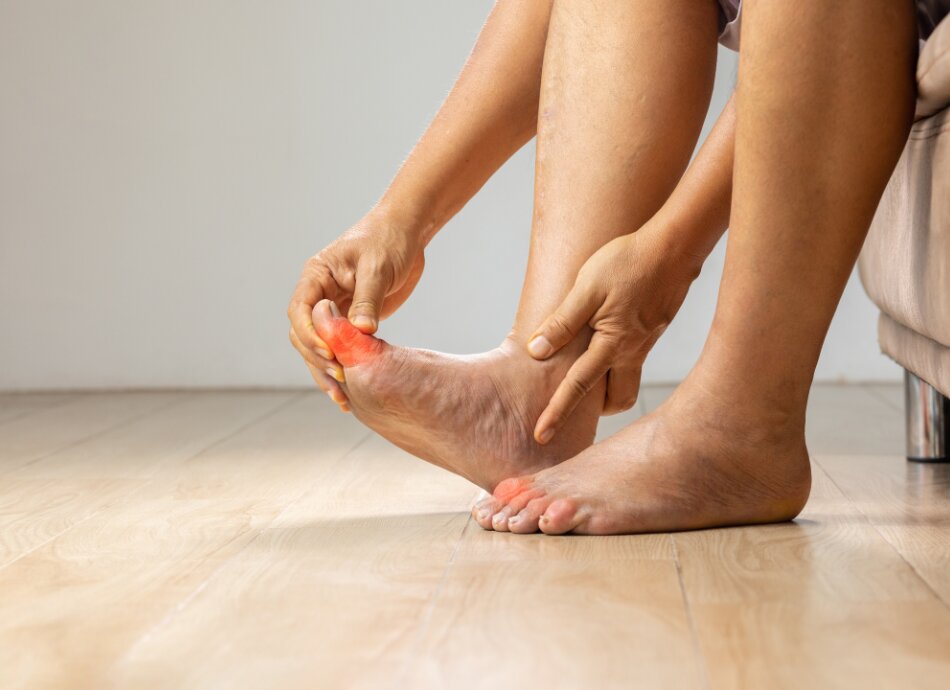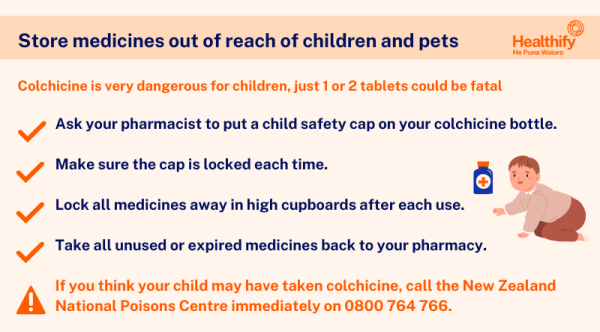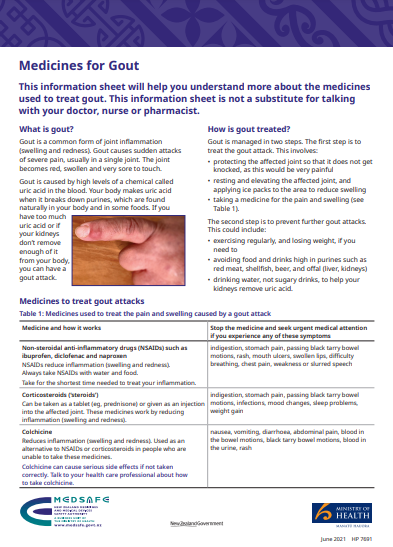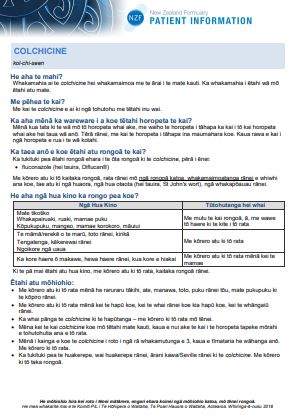Wishing everyone happy holidays and a joyful New Year from the Healthify team. Don't forget to Slip, Slop, Slap and Wrap!
Colchicine for gout
Sounds like 'KOL-chi-seen'
Key points about colchicine for gout
- Colchicine is used to treat and prevent gout.
- Colchicine is also called Colgout®.
- It's important to store colchicine safely, out of reach and out of sight of children.
- Find out how to take it safely and possible side effects.

Colchicine is used to treat a gout attack (flare)
Colchicine is used to relieve pain and swelling when you have gout flares (attacks). It works by reducing the build-up of uric acid crystals in the affected joints and by reducing your body’s inflammatory reaction to the uric acid crystals in the affected joint. This reduces pain and swelling. Colchicine works best if you take it at the first sign of gout pain, redness and swelling. Read more about gout and medicines for gout.
Colchicine is also used to prevent gout attacks when you are starting allopurinol or febuxostat
Colchicine is also used to prevent gout attacks while starting on urate-lowering therapy such as allopurinol or febuxostat. These medicines limit the amount of uric acid your body makes. When starting them, it’s common to have gout flare-ups as they start to dissolve some of the uric acid crystals in your joints. To prevent these flare ups it's recommended you take colchicine regularly for the first 3 to 6 months of starting allopurinol or febuxostat, until your target serum urate level has been reached. It's important to take colchicine regularly during this time; try not to miss a dose because gout flares can occur soon after stopping colchicine.
Keep medicines out of reach of children
| Store colchicine out of reach of children – as little as 1 or 2 tablets may be fatal for children. |
|

Image credit: Healthify He Puna Wairoa
|
In Aotearoa New Zealand, colchicine is available as 0.5 mg tablets.
|
Dose to treat a gout attack (flare)
Colchicine works best if you take it at the first sign of gout pain, redness and swelling.
- Take 2 tablets straight away, followed by 1 tablet one hour later. Don't repeat this course within 3 days.
- If you get nausea (feeling sick) or diarrhoea (runny poo), stop taking colchicine.
Dose to prevent gout attacks when you are starting allopurinol or febuxostat
- The usual dose is 1 tablet once a day. Your dose may be increased to 1 tablet 2 times a day if you're still having gout flares.
- If you get diarrhoea (runny poo) from taking colchicine you may be advised to lower your dose to 1 tablet on alternate days (every other day).
- When you start allopurinol or febuxostat, it's recommended you take colchicine for 3 to 6 months, until your target serum urate level has been reached.
- It's important to take colchicine regularly during this time; try not to miss a dose because gout flares can occur soon after stopping colchicine.
- If you're taking colchicine regularly to prevent an attack, but have an attack and need a treatment doses, have the treatment then wait 12 hours before re-starting your regular colchicine dose for prevention.
Extra care is needed when taking colchicine
- Most people who take colchicine have no problems but extra care is needed when taking it.
- Colchicine is considered a high-risk medicine because it can cause serious side effects. There isn’t a big difference between a safe dose of colchicine and a harmful dose. People who are over 65 years of age or have kidney or liver problems are especially at risk.
- This means you must always take colchicine exactly as prescribed.
- See below for signs you may be taking too much colchicine.
- Swallow your tablet whole with a full glass of water.
- Take it with food to reduce stomach upset.
- If you have taken colchicine to treat a gout attack in the last 3 days, don't start another treatment course. Discuss with your doctor first.
Here are some things to know when you're taking colchicine. Other things may be important as well, so ask your healthcare provider what you should know about.
- Colchicine is not effective for other types of pain relief: Colchicine is only suitable for gout-related pain. It will not help with other types of pain. Talk to your healthcare provider about this.
- Alcohol: Avoid drinking alcohol as it can cause stomach problems.
- Grapefruit and grapefruit juice: Don't drink grapefruit juice as it increases the risk of side effects.
- Taking other medicines: Colchicine interacts with some medicines and herbal supplements, so check with your doctor or pharmacist before starting colchicine or before starting any new medicines. This includes medicines that you may only need to take for a short time such as some antibiotics or antifungals and supplements you may buy over the counter.
- Effects on fertility: There are some reports that colchicine can cause a reduced sperm count in men if it's taken long term. But this is usually reversible when you stop treatment. If you're concerned, talk to your healthcare provider. There is no evidence to show that taking colchicine reduces fertility in women.
Colchicine can cause serious side effects, although not everyone gets them.
| Side effects | What should I do? |
|---|---|
|
|
|
|
Read more about medicines and side effects and reporting a reaction you think might be a side effect.
The following links have more information on colchicine:
Colchicine(external link) (te reo Māori(external link)) NZ Formulary Patient Information
Colgout(external link) Medsafe Consumer Information Sheet, NZ
Brochures
Medicines for gout(external link) Medsafe and Ministry of Health, NZ, 2021 English(external link), te reo Māori(external link), Samoan(external link)
Colchicine in te reo Māori(external link) My Medicines, NZ, 2018
Colchicine(external link) RheumInfo
Medicines and side effects(external link) Healthify He Puna Waiora, NZ, 2024
5 questions to ask about your medications(external link) Health Quality and Safety Commission, NZ, 2019 English(external link), te reo Māori(external link)
References
- Factors contributing to colchicine toxicity(external link) Medsafe, NZ, 2025
- Colchicine – painful insights from recent poisoning data in New Zealand(external link) Medsafe, NZ, 2021
- Spotlight on colchicine(external link) Medsafe, NZ, 2018
- Keeping patients informed about colchicine use(external link) Medsafe, NZ, 2014
- Managing gout in primary care(external link) BPAC, NZ, 2018
- Colchicine(external link) NZ Formulary
Brochures

Medsafe and Ministry of Health, NZ, 2021
English(external link)Te reo Māori(external link)
Samoan(external link)

Medicines and side effects
Healthify He Puna Waiora, NZ, 2024

My Medicines, NZ, 2018
Credits: Healthify editorial team. Healthify is brought to you by Health Navigator Charitable Trust.
Reviewed by: Angela Lambie, Pharmacist, Auckland
Last reviewed:
Page last updated:





